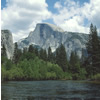New York Times, August 3, 2009
Californians’ eagerness to battle global warming seems to be cooling a bit: The latest survey on the state’s environmental attitudes, released on Wednesday, showed that 47 percent consider the threat of global warming very serious, a decline of seven percentage points from two years ago.

Two-thirds of Californians now support the 2006 Global Warming Solutions Act, the landmark 2006 legislation requiring the state to slash its greenhouse gas emissions — down from 78 percent two years ago.
Still, 61 percent of Californians say the effects of global warming are already occurring, only a slight decline from last year’s 64 percent, and above the 53 percent in the rest of the country, as measured in a March Gallup poll.
And when it comes to old-fashioned air pollution, just 23 percent of residents think that’s a big problem, a drop of 11 percentage points from last year. California is home to two of the most polluted regions in the country — the Inland Empire east of Los Angeles and the agricultural Central Valley.
The annual survey on Californians and the environment was conducted by the Public Policy Institute of California, with support from the William and Flora Hewlett Foundation.
Mark Baldassarre, the institute’s president, said that there continues to be strong support among Californians for climate change policies, but those policies are debated along increasingly partisan lines.
The P.P.I.C. poll showed that 86 percent of Democrats favor regulating greenhouse gas emissions from refineries, power plants, and motor vehicles, versus 54 percent of Republicans and 79 percent of independents. Likewise, 57 percent of Democrats favor a cap-and-trade program to curb emissions, but 55 percent of Republicans oppose it; independents are almost evenly split.
Stephen H. Schneider, a Stanford professor of environmental biology and global change, suggested that the slippage could be due to current economic woes and also to the absence of natural disasters. Without last year’s big wildfires or Gulf hurricanes of the magnitude of Ivan in 2004 or Katrina in 2005, “people slip back” into complacency, he said.
Steven F. Hayward, a fellow at the American Enterprise Institute, a conservative think-tank in Washington, said the cooling off of California’s attitudes “shows us the limits of how far you can go in regulating the economy and raising the cost of goods in service of the environment.”
But Kathryn Phillips of the Environmental Defense Fund’s Sacramento office takes the longer view. Not many years ago, she said, “If we heard about 66 percent of Californians being worried about greenhouse gases, we would have thought we hit the jackpot.”

